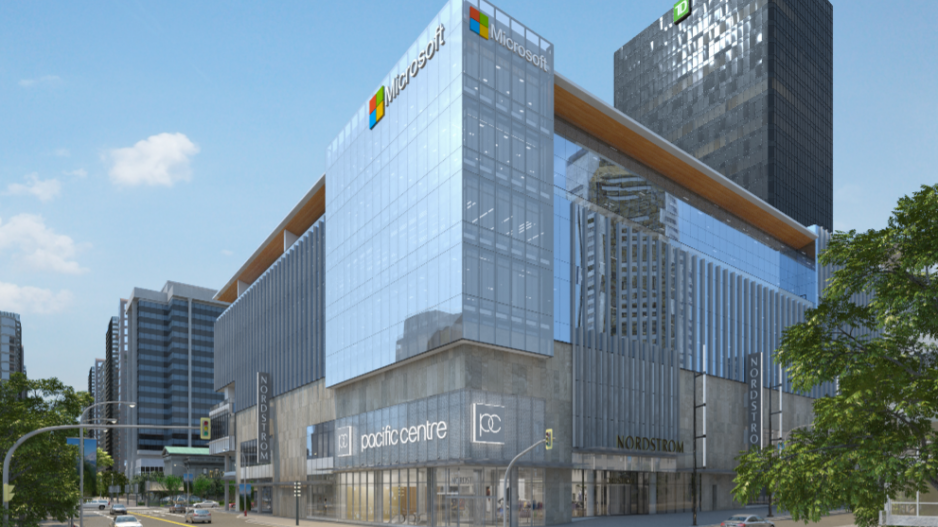Perched atop a just-renovated Pacific Centre, Microsoft’s (NASDAQ:MSFT) new downtown Vancouver office is summed up as “fantastic” by the tech giant’s corporate vice-president.
“Inside, it’s a lot of collaborative spaces that are getting created for our engineers to innovate, think free, not see boundaries,” TK Rengarajan told Business In Vancouver after flying up from San Francisco to speak at the B.C. Tech Summit January 18-19.
Those offices drew controversy, though, when it was revealed in December 2014 many of the new hires would not actually be Canadians due to a government exemption. This came after both Ottawa and Victoria championed the new offices in April 2014 for doubling Microsoft’s local workforce from 400 to 800.
And although the loonie has dipped to a 13-year low of US68¢, Rengarajan wouldn’t commit to expanding a Canadian workforce that would come cheaper.
“The loonie goes up and down,” he said.
“But our interest is long term. In my mind, the labour market around the world all settles over time.”
Instead, Rengarajan said access to the gaming talent that has already been cultivated in the city is what excites him most about the expanding headcount in Vancouver.
Burnaby is home to EA Canada, while Microsoft employs more than 300 Vancouverites at its two big gaming studios, Big Park and Black Tusk.
“Everyone of the (global development centres) gives us access to incredible people, access to ecosystems, access to markets. And Vancouver represents access to the gaming ecosystem,” Rengarajan said.
“It’s the big development centre in Canada.”
Like Rengarajan, GE Canada CEO Elyse Allan said her focus on the B.C. tech sector is on the long-term, especially when it comes to the energy sector.
In August 2015, GE Canada landed a deal to supply 61 wind turbines to B.C.’s largest wind farm.
And Allan noted that Shell and Petronas would be using GE technology on proposed liquefied natural gas (LNG) facilities built off the B.C. coast.
“The dollar is helpful, but as a long-term investor you look for the talent,” said the New York transplant who has spent the past 11 years at the helm of GE Canada.
Allan said one of the reasons she was both attending and speaking at the B.C. Tech Summit was for the chance to connect with startups.
While GE Canada has the ability to generate power, transmit power and even supply the LED light bulbs that would use that same power, the CEO said a corporate giant like hers has to be collaborative with the smaller players.
“You have to reach out and pay attention to the fringes because I would say that innovation happens on the fringes,” she said.
In 2014, GE acquired Vancouver-based Wurldtech to provide cyber security for industrial sites, such as power plants.
The company has also launched licensing programs in Alberta and Nova Scotia that allow startups to access GE’s technologies and then receive support from the respective provincial governments to develop products based on that technology.
Allan said she applauded B.C.’s own technology strategy, which was unveiled in its entirety at the B.C. Tech Summit on January 18.
The strategy includes the creation of a developers exchange, a more streamlined version of the B.C. Provincial Nomination Program that brings specialized workers across the border, a commitment to introduce coding into K-12 classes and a previously announced $100-million venture capital fund for tech startups.
“Those are the right types of actions,” Allan said.
“We know that the big challenge that we (in Canada) have is commercialization. Canada’s actually been great for startups. We continue to get stymied in the ability of those startups to scale through commercialization and move into a global vision of where they want to be.”
Allan added she’s also confident the province’s cleantech sector would continue to grow, especially if the struggling resources sector recovers quickly.
Calgary energy giants Suncor and Cenovus announced January 14 they would contribute up to $100 million to Vancouver-based cleantech fund, Evok Innovations. The fund’s goal is to supply cleantech startups with venture capital to jumpstart their innovations.
“With the opportunity for LNG, and the opportunity for oil and gas here, again taking science and taking technology and applying it to these industries is a winning opportunity for Canada,” Allan said.
“We don’t have to dismiss the resources we have.”




